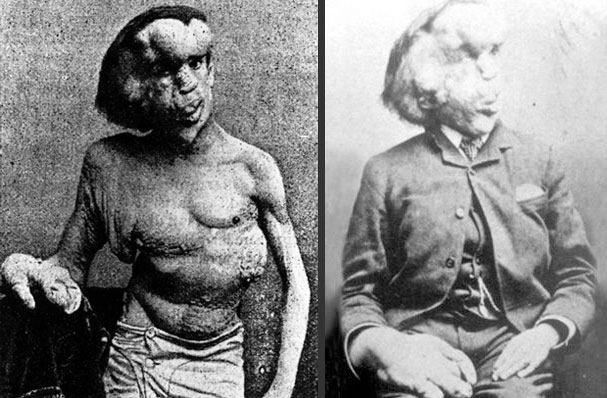Discover the mystery of 'the elephant'
Could the study of DNA reveal the past century's mystery behind the horrific deformation of the British 'elephant' ?
Joseph Merrick, born in 1862 in Leicester, was the horror of a young, socially disadvantaged young Victorian queen. But Merrick 'the elephant' later became immortal in film and drama. He is also one of the greatest mysteries of modern medical history: 122 years since Merrick's death, no one knows the exact reason for his horrific body deformity. However, thanks to modern technology, experts hope to clarify the questions related to this character.

Joseph Merrick bravely lived as an "elephant".
The medical community began to pay attention to Merrick's case in the 1880s. Since then, they have been looking for ways to explain growth beyond control, making the 'elephant' initially social. alienated and later became famous for his different people. By the end of his life, his courage and humility were recognized and respected by everyone. Initially, the doctors assumed Merrick suffered from elephantiasis, which only caused parasite infection and thickening of the skin and cells, and that was why he was called an "elephant". .
By 2001, some scientists argued that Merrick had a rare condition called Proteus syndrome . However, other experts questioned this possibility, saying that the way the disease progresses is not the same as those with the syndrome.
After many years, experts once again focused their efforts on studying the 'elephant' case. Scientists will extract DNA from Merrick's remains, which has been preserved at the Royal London Hospital in Whitechapel since the elephant died in 1890, enjoying 27 years of age.
The Independent newspaper quoted lead researcher Professor Richard Trembath of the University of London, who said the experiments would be conducted to determine if Merrick's genetic sequence could be deciphered to determine any condition. genetically modified. However, other experts are concerned that the results may not be desirable because Merrick's skeleton is not well preserved. However, this is arguably the most likely approach if you want to decipher the long-standing mystery involving elephants.
- Wild buffalo buffalo elephants fly a few meters
- Elephant Gold - 'treasure' of the Dak Lak Elephant Conservation Center
- Discovered strange pink elephant in Thailand
- Video: Humorous scenes of mother elephants rescuing children from drowning
- Find out the mystery of the Elephant's death
- The black elephant 'strum' is close to the white elephants
- Great discoveries about giant elephants
- The male elephant trampled the female elephant
- Elephants wear contact lenses
- Africa suffered, helplessly watching the 1/3 of its elephants in the last 7 years
- Attempt to decipher the elephant secret
- Kenya employs 1,000 rangers to combat elephant poaching
 'Fine laughs' - Scary and painful torture in ancient times
'Fine laughs' - Scary and painful torture in ancient times The sequence of numbers 142857 of the Egyptian pyramids is known as the strangest number in the world - Why?
The sequence of numbers 142857 of the Egyptian pyramids is known as the strangest number in the world - Why? Miracle behind the world's largest stone Buddha statue
Miracle behind the world's largest stone Buddha statue What is alum?
What is alum?